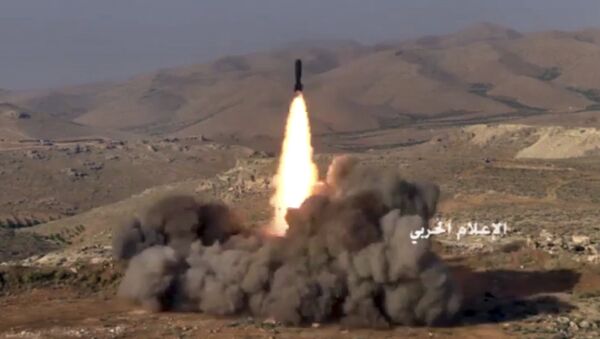Israeli Prime Minister Benjamin Netanyahu has claimed that the Lebanon-based militant group Hezbollah is trying to set up alternative precision missile plants.
He added that Hezbollah currently has "at most, a few dozen" precision-guided missiles in its arsenal.
"Those sites near the Beirut airport, the underground sites for precision conversion of missiles, which [Israeli] military intelligence gave me, to expose, those sites were closed. They are trying to open other sites. But through these measures we are denying them precision arms", Netanyahu said.
READ MORE: Israel Calls for Anti-Hezbollah Sanctions as Its Anti-Tunnel Operation Unfolds
Separately, Netanyahu said that ahead of the upcoming UN Security Council meeting, he asked Russia to condemn Hezbollah actions.
"I […] spoke with Russian President Vladimir Putin on the eve of this meeting and asked Russia to take the right position, namely, to condemn Hezbollah, not support them or remain neutral,” Netanyahu pointed out.
He recalled that on Thursday, the UN Security Council will discuss the Hezbollah attack tunnels crossing from Lebanon into Israel, something that the Jewish state is trying to destroy.
READ MORE: Ex-Israeli Defence Chief Lambasts Operation to Destroy Hezbollah Tunnels
His remarks came after Hezbollah's second-in-command, Sheikh Naim Qassem, told Iran's al-Vefagh newspaper that his group is capable of targeting any point in Israel with its missiles.
"There is not a single point in the occupied territories out of reach of Hezbollah's missiles", Qassem said.
According to him, the missiles serve to deter Israel from starting another war with Lebanon by exposing the "Israeli home front".
READ MORE: Hezbollah Leader Vows to Respond to Any Israeli Attack on Lebanon — Reports
Tensions between the Jewish state and Beirut escalated in recent months after Israeli Prime Minister Benjamin Netanyahu warned that Israel would not let Hezbollah and Iran "get away with" the alleged stationing of precision missiles in Lebanon, including around Beirut's international airport.
In 2006, Israel invaded Lebanon in response to a cross-border raid by Hezbollah and the abduction of two Israeli soldiers. The conflict, which lasted 34 days and claimed the lives of over 1,300 people, was halted by a UN-brokered ceasefire.



